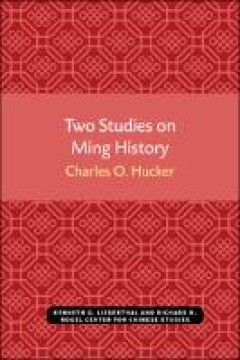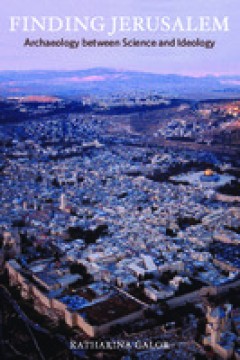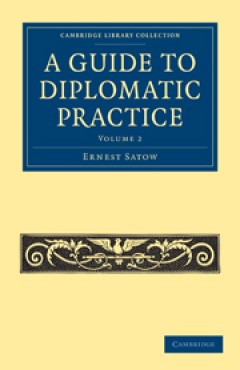Filter by

A Hand-Book for Travellers in Spain, and Readers at Home
Targeted at both intrepid travellers and 'readers at home', this two-volume account of Spanish history, topography and culture by Richard Ford (1796–1858) combines the rigour of a gazetteer with the humour and pace of a private travel diary. First published in 1845, as part of John Murray's series of guidebooks, the work made an immediate impact upon the reading public, and it was celebrated …
- Edition
- -
- ISBN/ISSN
- 9781139096157
- Collation
- -
- Series Title
- Cambridge Library Collection - Travel, Europe
- Call Number
- -

A Hand-Book for Travellers in Spain, and Readers at Home
Targeted at both intrepid travellers and 'readers at home', this two-volume account of Spanish history, topography and culture by Richard Ford (1796–1858) combines the rigour of a gazetteer with the humour and pace of a private travel diary. First published in 1845, as part of John Murray's series of guidebooks, the work made an immediate impact upon the reading public, and it was celebrated …
- Edition
- -
- ISBN/ISSN
- 9781139096140
- Collation
- -
- Series Title
- Cambridge Library Collection - Travel, Europe
- Call Number
- -

Two Studies on Ming History
In the first study of Two Studies on Ming History , Charles O. Hucker presents an account of a military campaign that provides insight into the nature of civil officials' authority, decision-making, and relationship with the Ming court. In the spring and summer of 1556, a Chinese renegade named Hsü Hai led an invading group of Japanese and Chinese soldiers on a plundering foray through the nor…
- Edition
- -
- ISBN/ISSN
- -
- Collation
- -
- Series Title
- -
- Call Number
- 900

Finding Jerusalem: Archaeology between Science and Ideology
Archaeological discoveries in Jerusalem capture worldwide attention in various media outlets. The continuing quest to discover the city’s physical remains is not simply an attempt to define Israel’s past or determine its historical legacy. In the context of the ongoing Israeli-Palestinian conflict, it is also an attempt to legitimate—or undercut—national claims to sovereignty. Bridging …
- Edition
- -
- ISBN/ISSN
- 9780520968073
- Collation
- -
- Series Title
- -
- Call Number
- 900

A Genealogy of Evil Anti-Semitism from Nazism to Islamic Jihad
Based on extensive scrutiny of primary sources from Nazi and Jihadist ideologues, David Patterson argues that Jihadist anti-Semitism stems from Nazi ideology. This book challenges the idea that Jihadist anti-Semitism has medieval roots, identifying its distinctively modern characteristics and tracing interconnections that link the Nazis to the Muslim Brotherhood to the PLO, Fatah, Hamas, Islami…
- Edition
- -
- ISBN/ISSN
- 9780511762420
- Collation
- -
- Series Title
- -
- Call Number
- -

A Grammar of the Mahratta Language To Which Are Added Dialogues on Familiar …
Marathi, an official language of Maharashtra and Goa, is among the twenty most widely spoken languages in the world. The southernmost Indo-Aryan language, it is also spoken in Gujarat, Madhya Pradesh, Karnataka, and Daman and Diu, and is believed to be over 1,300 years old, with its origins in Sanskrit. First published in 1805, this grammar of Marathi (then known as Mahratta) was compiled by th…
- Edition
- -
- ISBN/ISSN
- 9781139519847
- Collation
- -
- Series Title
- Cambridge Library Collection - Perspectives from the Royal Asiatic Society
- Call Number
- -

A Greek Army on the March Soldiers and Survival in Xenophon's Anabasis
Professor Lee provides a social and cultural history of the Cyreans, the mercenaries of Xenophon's Anabasis. While they have often been portrayed as a single abstract political community, this book reveals that life in the army was mostly shaped by a set of smaller social communities: the formal unit organisation of the lochos ('company'), and the informal comradeship of the suskenia ('mess gro…
- Edition
- -
- ISBN/ISSN
- 9780511482830
- Collation
- -
- Series Title
- -
- Call Number
- -

Carl Friedrich von Weizsäcker : Pioneer of Physics, Philosophy, Religion, Po…
This book offers a collection of texts by Carl Friedrich von Weizsaecker (1912-2007), a major German universal scientist who was a pioneer in physics, philosophy, religion, politics and peace research. He started as an assistant to the physicist, Werner Heisenberg, held professorships in theoretical physics (Strasbourg), physics (Goettingen) and philosophy (Hamburg) and was a co-director (with …
- Edition
- 1
- ISBN/ISSN
- -
- Collation
- XXVIII, 166
- Series Title
- SpringerBriefs on Pioneers in Science and Practice
- Call Number
- 900

A Grammar of the Sungskrit Language To Which Are Added Examples for the Exer…
The Indo-Aryan language of Sanskrit is the primary language of Hinduism and also a scholarly language of Buddhism. Dating back to the second millennium BCE, it is considered to be the parent of most modern languages of India, and remains central to work in Indo-European studies, philology and linguistics today. First published in 1806, this is a comprehensive grammar of Sanskrit, compiled by th…
- Edition
- -
- ISBN/ISSN
- 9781139507264
- Collation
- -
- Series Title
- Cambridge Library Collection - Perspectives from the Royal Asiatic Society
- Call Number
- -

A Guide to Diplomatic Practice
Recruited straight from university, Ernest Satow (1843–1929) became one of the most respected British diplomats, particularly in Japan, where he is still remembered. After a career spent mostly in the rapidly developing Far East, he retired in 1906. Just before the outbreak of war, he was asked to compile a work on international diplomacy, and 'Satow', as it has become known, was first publis…
- Edition
- -
- ISBN/ISSN
- 9780511995200
- Collation
- -
- Series Title
- Cambridge Library Collection - British and Irish History, General
- Call Number
- -
 Computer Science, Information & General Works
Computer Science, Information & General Works  Philosophy & Psychology
Philosophy & Psychology  Religion
Religion  Social Sciences
Social Sciences  Language
Language  Pure Science
Pure Science  Applied Sciences
Applied Sciences  Art & Recreation
Art & Recreation  Literature
Literature  History & Geography
History & Geography